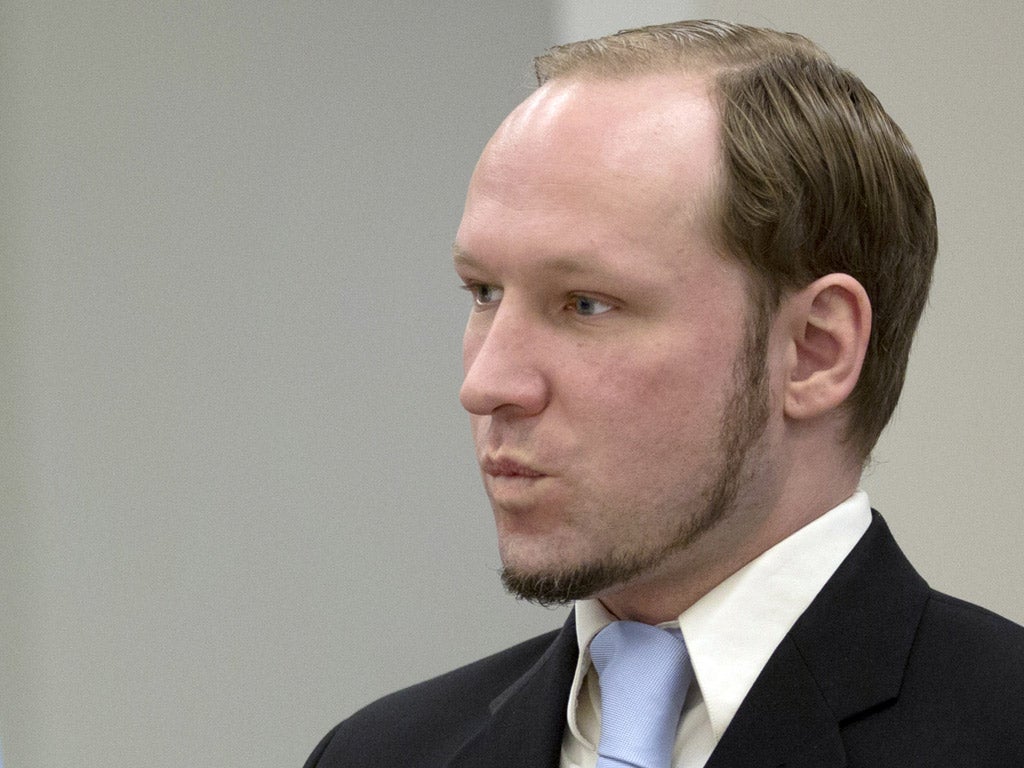Rambling killer Anders Breivik asks to be cleared as trial ends

Your support helps us to tell the story
From reproductive rights to climate change to Big Tech, The Independent is on the ground when the story is developing. Whether it's investigating the financials of Elon Musk's pro-Trump PAC or producing our latest documentary, 'The A Word', which shines a light on the American women fighting for reproductive rights, we know how important it is to parse out the facts from the messaging.
At such a critical moment in US history, we need reporters on the ground. Your donation allows us to keep sending journalists to speak to both sides of the story.
The Independent is trusted by Americans across the entire political spectrum. And unlike many other quality news outlets, we choose not to lock Americans out of our reporting and analysis with paywalls. We believe quality journalism should be available to everyone, paid for by those who can afford it.
Your support makes all the difference.The trial of Anders Breivik has ended with the confessed mass killer demanding to be set free and vowing that history would exonerate him for a bomb-and-gun rampage that killed 77 people.
The self-styled anti-Muslim militant got the final word in the 10-week proceedings, but it is unclear whether it helped the main point of his defence: trying to prove that he is sane.
In a rambling statement, Breivik lashed out at everything he finds wrong with the world, from non-ethnic Norwegians representing the country in the Eurovision Song Contest to the sexually liberated lifestyle of the characters in the American TV show Sex and the City.
Incorporating current events into his statement, he claimed that fellow right-wing extremists were behind a small amount of explosives found outside a Swedish nuclear plant this week. Swedish police spokesman Tommy Nyman had no comment "especially not if he says it."
While some of Breivik's comments prompted laughter in the Oslo court, a serious atmosphere returned when he reiterated his motive for bombing the headquarters in Oslo, killing eight, and hunting down teenagers at the Labour Party's youth camp.
Sixty-nine people were killed and dozens more injured in one of the worst peacetime shooting massacres by a single gunman.
"History shows that you have to commit a small barbarism to prevent a bigger barbarism," the 33-year-old Norwegian said.
"The attacks on July 22 were preventive attacks to defend the indigenous Norwegian people," he said. "I therefore demand to be acquitted."
Breivik claims the governing Labour Party has betrayed the country by accepting Muslim immigrants and must be stopped before turning Norway into what he called a "multiculturalist hell."
Earlier defence lawyer Geir Lippestad had tried to prove his client is sane - the key issue to be resolved in the trial since Breivik admits the attacks.
Mr Lippestad also formally entered a plea for acquittal, but it was made out of principle, without any realistic chance of success.
Relatives of some of those killed tried to put their loss in words. Kirsti Loevlie, whose 30-year-old daughter Hanne was killed by the bomb, moved the court room to tears when she described the shock of finding out her daughter was dead. The grief of cleaning out her room. The first Christmas without her.
Still, Ms Loevlie said she felt a need to attend the trial, seeing Breivik in a position where he couldn't hurt anyone anymore.
"I am not going to be afraid of this man," she said. "I decided I would go to court. I felt I owed it to Hanne."
The court room burst out in applause and audible sobs as she finished her statement.
Breivik remained motionless, his face blank.
Mr Lippestad tried to prove to the court that Breivik's claims of being a resistance fighter in a struggle to protect Norway and Europe from being colonised by Muslims are not delusional, but part of a political view shared by other right-wing extremist.
"He realised that it is wrong to kill but he chose to kill. That's what terrorists do," Lippestad Mr said. "The ends justify the means. You don't understand this if you don't understand the culture of right-wing extremists."
When Breivik talks about a civil war he's not fantasising about tanks and soldiers in the forest, but referring to a low-intensity struggle he believes will last for 60 years, Lippestad said.
"None of us know what Europe will look like in 60 years," Mr Lippestad said. "Who would have thought 10 years ago that a right-wing extremist party in Greece would get 10 per cent in the election now?"
Two teams of psychiatrists reached opposite conclusions about Breivik's mental health. The first team diagnosed him with "paranoid schizophrenia," a serious mental illness. The second team found him legally sane, saying he suffers from a ant-social and narcissistic personality disorder, but is not psychotic.
Prosecutors had called for an insanity ruling, saying there was enough doubt about Breivik's mental state to preclude a prison sentence.
The five-judge panel will announce its ruling on August 24, chief judge Wenche Elisabeth Arntzen said.
If deemed mentally competent, Breivik is likely to be given Norway's maximum prison term of 21 years. A sentence can be extended beyond that if a prisoner is considered a menace to society.
If declared insane, he would be committed to a mental institution for as long as he is considered sick and dangerous to others. Prosecutors suggested that could mean he would be held for the rest of his life.
Mr Lippestad's statement ended on a confusing note when he asked the court for the most lenient possible prison sentence for his client.
After being corrected by Breivik, Mr Lippestad said the defence was asking for an acquittal or a lenient sentence, but primarily wanted the court to reject the insanity claim.
AP
Join our commenting forum
Join thought-provoking conversations, follow other Independent readers and see their replies
Comments